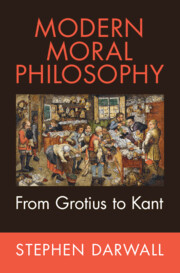Book contents
- Modern Moral Philosophy
- Modern Moral Philosophy
- Copyright page
- Dedication
- Contents
- Preface
- Acknowledgments
- Introduction
- 1 Grotius
- 2 Hobbes and Pufendorf
- 3 Locke and Cumberland
- 4 Spinoza, Cudworth, Shaftesbury, and Leibniz
- 5 Hutcheson and Butler
- 6 Hume and Smith
- 7 The British Rationalists and Reid
- 8 Rousseau and Kant
- Works Cited
- Index
1 - Grotius
Published online by Cambridge University Press: 10 June 2023
- Modern Moral Philosophy
- Modern Moral Philosophy
- Copyright page
- Dedication
- Contents
- Preface
- Acknowledgments
- Introduction
- 1 Grotius
- 2 Hobbes and Pufendorf
- 3 Locke and Cumberland
- 4 Spinoza, Cudworth, Shaftesbury, and Leibniz
- 5 Hutcheson and Butler
- 6 Hume and Smith
- 7 The British Rationalists and Reid
- 8 Rousseau and Kant
- Works Cited
- Index
Summary
Hugo Grotius is best known as one of the originators of international law. Philosophers of the period also saw him as making a fundamental break with ancient philosophy and Thomistic classical natural law deriving from Aristotle. Grotius carried forward an important distinction made by Francisco Suarez between “law” and “counsel.” Good moral reasons may counsel action without yet requiring it. Law, by contrast, obligates, and obligation is conceptually related to accountability. It concerns what we would be blameworthy for failing to do without excuse. Grotius develops a theory of natural rights and law and sets the philosophical agenda by asking what could ground such a law (Anscombe’s Challenge). His response is human “sociability,” by which he means not simply any desire to affiliate, but the drive to live with others on terms of mutual accountability.
- Type
- Chapter
- Information
- Modern Moral PhilosophyFrom Grotius to Kant, pp. 15 - 38Publisher: Cambridge University PressPrint publication year: 2023

